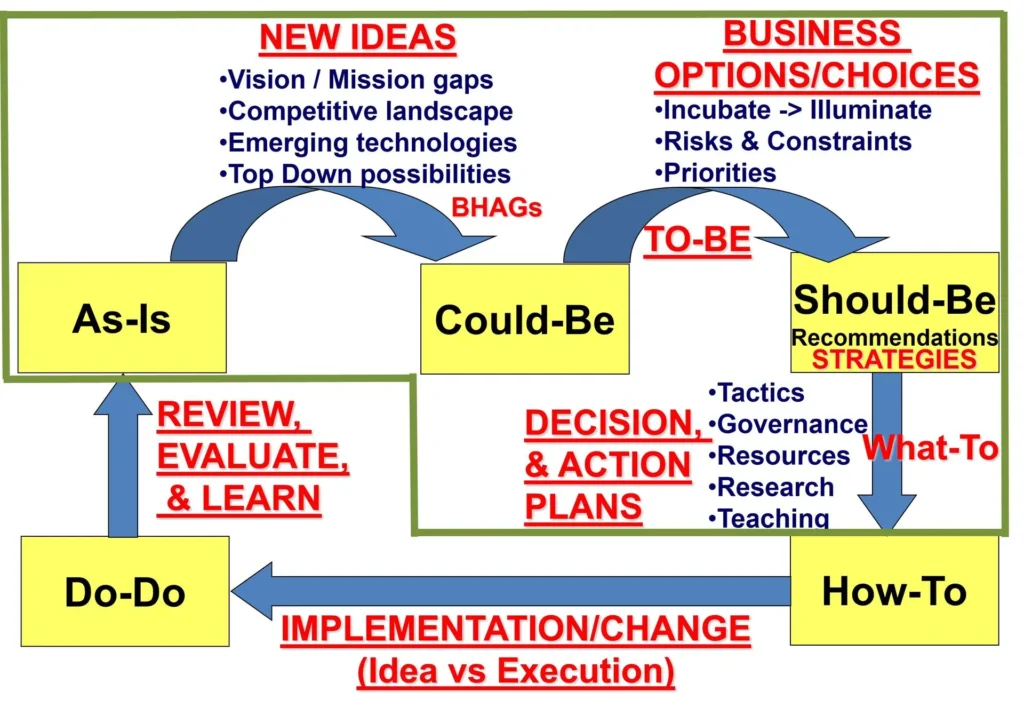• The courses in this program prepare IT and non-IT professionals, business/management consultants, and service providers to become digital transformation leaders.
• GIIM will work with you to derive the appropriate focus & content for the courses within this certificate, based on the specific consulting firm (e.g., Management Consulting, IT Consulting, Human Resources (HR), Financial Advisory, Marketing and Advertising, Environmental, Healthcare, Legal, Strategy Consulting, Public Relations (PR)), and the backgrounds and objectives of the candidates.



It begins with identifying new ideas such as vision gaps, emerging technologies, and market opportunities, which are explored in the “Could-Be” phase. These ideas evolve into business options and strategies in the “Should-Be” stage, where key decisions are shaped by risk analysis and prioritization. The “How-To” stage defines actionable steps, involving tactics, governance, and resource planning. Execution occurs in the “Do-Do” phase, supported by strong implementation and change management. Finally, outcomes are reviewed in the “Review, Evaluate, & Learn” phase, feeding insights back into the cycle for continuous improvement. This process ensures a balance between ideation and execution, enabling organizations to adapt and lead effectively in dynamic environments.

As firms increase their investments in information technology as part of a transformational business strategy, and leverage these investments in their competitive strategies and drive for performance improvement, it is essential to understand how to effectively manage these information technology resources. There are numerous decisions to be made about managing IT resources and they involve business and IT and executives across the firm.
Experience has made it clear that firms need well-thought out organizational structures, processes, and governance (decision rights) to ensure that the decisions about how to leverage IT investments are well thought-out and integrated across the enterprise in order to obtain business value. This course will help candidates understand the important decisions related to the management of IT resources and the types of organizational structures, strategies, and processes that will help effectively and efficiently attain value to the enterprise. The course concentrates on developing the participant’s competency in understanding and applying current/emerging issues and methods in creating and coordinating the key activities necessary to manage the 21st century tactical and operational IT functions of a firm for effective transformation.
Topics include:
In the 21st century management consultants are often called upon to address business and IT and operations, processes, and strategies which enable and drive organizations to become more competitive and profitable in rapidly evolving technology-centered marketplaces. The deployment of emerging information technologies for revenue generating initiatives has accelerated the pace of strategic and operational change as well as enabled/driven new business ‘disruptors’ to enter markets previously considered to be stable and resistant to innovation.
Management consultants must become trusted advisors to senior IT and non-IT client executives to help them address critical client business problems and get their buy-in on how to address these issues and opportunities in a way that ensures business value generation. Management consulting engagements and projects must begin with consensus-building among senior IT and non-IT executives to ensure understanding and agreement on how best to improve the competitive position, alignment of business and IT strategies and operating performance, establish appropriate business and IT organizational and process infrastructures and value-related analytics, and address business and IT governance and sourcing considerations.
This course will concentrate on developing the participants’ competency in engaging with clients to assist them in evaluating, establishing and coordinating the key strategic and operational options, processes, activities and organizational structures required to manage the business and IT functions of in today’s technologically intensive environment that will generate measurable and sustainable business value. This course, and others, in this Certificate will be grounded on the principles and implications of the Henderson-Venkataraman Strategic Alignment Model (SAM) and Luftman’s Strategic Alignment Maturity Assessment.
Course Topics include:
Management consultants must become trusted advisors to senior IT and non-IT client executives to help them address critical client business problems and get their buy-in on how to address these issues and opportunities in a way that ensures business value generation. This requires not merely the initiation and development of sustainable contractual relationships, but the establishment of trusted and valued relationships that enrich the client’s perceptions of the consultant’s value as well as the nature of their own business and potential for transformation.
This course will concentrate on developing the participants’ competency in engaging with clients throughout the pre-sales, business development and delivery processes in ways that help the participant understand the essentials of client engagement, building a contractual relationship, sourcing the right resources to address the client’s key business issues and to build out the firm’s ‘footprint’ (its presence at the client) in a way that the client values the relationship with the consultant and wants more services.
Course Topics include:
Throughout one’s career in management consulting, it’s highly unlikely that a management consultant will be faced with executing the exact same project twice. This is due to the fact that different industries will have different value propositions, executive clients will have different styles of management and governance, alignment between business and IT will be different, and criteria for success will be different among various stakeholders (this is a polite way of saying that internal politics and culture in each client will be different), let alone the dynamics of the industry and technology. How the management consultant and the consulting team guides the client through an engagement to get to a consensus-based solution is the subject of this course.
While the process of management consulting projects is often deceptively similar from engagement to engagement – e.g., the “Consulting Life Cycle” – the tools and techniques leveraged by experienced management consultants need to reflect the context of the sponsors’ and stakeholders’ points of view on:
Outstanding management consultants are those who can successfully leverage previous client experiences and the knowledge-based tools they’ve built and applied to facilitate engagements. All while creatively adapting to the different circumstances they are faced with in each new engagement and set of stakeholders.
This course will expose the candidate to practical and field-tested management consulting techniques and tools that are essential as part of the practical ‘toolbox’ of capabilities needed by management consultants and their teams to successfully execute a transformational engagement.
Course Topics include:
IT systems to support the HR processes are fundamental. Systems are available to support HR management, benefits, payroll, recruiting, employee-performance management, E-learning, employee portals/ self-service, workforce analytics, enterprise-incentive management, successor planning, travel, and vacation management. Sourcing considerations regarding make versus buy or in house versus outsource are essential. Vendors such as PeopleSoft, Lawson, Ultimate Software, let alone service providers such as ADP on demand consideration.
Internationalization and Inclusion: How To Hire, Train, Retain and Value Diverse Talent
There is a lot of debate about diversity in tech, “the IT sector needs to promote more diversity”, “the IT sector is already diverse”, “diversity can foster creativity and innovation”… but what does it mean diversity and which challenges does diversity bring with it?
Companies and organizations nowadays operate in a global marketplace, they need to operate in and from different locations and across sectors interacting with different cultures and environments, globally and locally. Globalization has also increased cultural diversity in our societies, and companies and organizations are recognizing its value in terms of innovation and creativity. Having a homogeneous workforce can in fact lead to conscious and unconscious biases that can also affect the development of some technologies like facial recognition and cybersecurity, among the others. While diverse backgrounds, viewpoints and experiences can help to overcome the blind spots, develop new innovative, inclusive and comprehensive technologies and increase the level of protection and security.
But together with opportunities, cultural diversity brings also challenges: from internal organizational structure to company strategy, from human resource management to interacting and doing business across different markets.
This is why how to hire, train, retain and value diverse talents and promote an inclusive workplace is becoming more and more a priority for companies in all sectors.
The course will enable participants to:
This course is offered only in face-to-face delivery for candidates and includes intensive real-world based case-study exercises that allow the candidate to apply their knowledge from any three of the above courses. It is conducted in a team-based setting led by experts from academia and business and has the objective of enabling the facilitated leadership/mentoring of discussions that apply the concepts of the certificate courses.
The purpose of this course is to acquaint students with the specialized legal aspects governing IT outsourcing arrangements. The course addresses negotiation of the outsourcing contract, including terms relating to legal risk, as well as terms, negotiation techniques and contract structures relating to the memorialization of the business deal. Additionally, the course addresses contract management as an on-going aspect of the outsourcing relationship, including dispute resolution, managing change, re-negotiation, and managing termination of the IT outsourcing relationship. No prior legal training is required to take this course. Successful completion of the course allows the student to achieve a useful level of specialized management knowledge.
Business process transformation is a critical aspect of IT management consulting. This course would satisfy the need for participants to understand the intimate connection between business transformation and the role of information technology (IT) as both an enabler and a driver of change. The emphasis of this course is on enterprise and IT integration and synergy creation. Effective design and implementations of business processes produce meaningful business performance improvements. This course will also address the identification and development of business performance criteria and metrics that can be used to manage both the process of transformation and the subsequent on-going management of the business.
Global Institute for IT Management © 2025